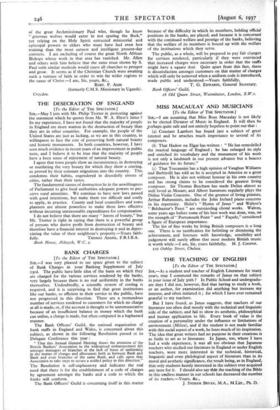THE TEACHING OF ENGLISH [To the Editor of THE SPECTATOR.]
SIR,—As a student and teacher of English Literature for many years, may I commend the remarks of Janus on that subject in your issue of July 3oth ? In Public School and undergradu- ate days I did not, however, find that having to study a book, or an author, for examination did anything but increase my interest, and often initiated it ; for which I have ever remained grateful to my teachers.
But I have found, as Janus suggests, that teachers of our literature too often deal mostly with the technical and linguistic side of the subject, and fail to show its aesthetic, philosophical and human application to life. Every book of value is the creation of a personality under the influence or limitations of environment (Milieu), and if the student is not made familiar with this social aspect of a work, he loses much of its inspiration. The idea that great writers had no purpose in their creations is as futile to art as to literature. In Japan, too, where I have had a wide experience, it was all too obvious that Japanese teachers who studied our literature in England or under English teachers, were more interested in the technical, historical, linguistic and even philological aspect of literature than in its moral and aesthetic significance, the result being, as in England, that only students keenly interested in the subject ever acquired any taste for it. I should also say that the teaching of the Bible in this soulless manner in our schools has decreased the number of its readers.—Yours, &c., J. INGRAM BRYAN, M.A., M.Litt., Ph. D.






































 Previous page
Previous page